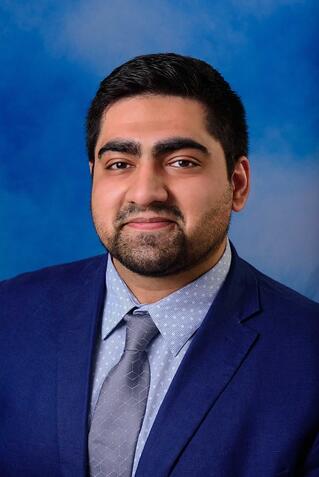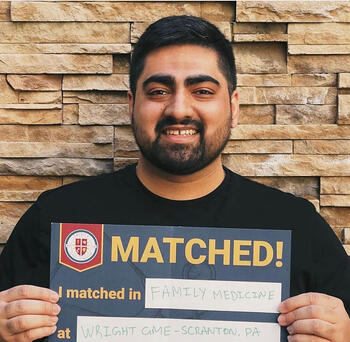
“I am excited to start my professional journey and can’t thank everyone enough for the help over the years to get to today. I’m eager to do some good in another community with a fantastic program and become a better physician for the patients I’ll be honored to call mine.”
-Dr. Anitesh Jaswal
Family Medicine
The Wright Center for Community Health
Trinity Graduate 2021
University of Alberta Alumnus
I’ve been involved in healthcare for as far back as I can remember. In undergrad I was always taking part in undergraduate research/fundraising with the University of Alberta and Stollery Children’s Hospital, my first job after my time at the U of A was working with the Alberta Urology Institute, with patients and some world class urologists. My boss at the time joked that if I wanted to really go further in healthcare, I’d have to go get a PhD or a MD. As much as I enjoyed research at the time, I found working with patients far more fulfilling and something that I thought I would love to be able to do as a career.
What’s your academic background?
I am a graduate of the University of Alberta, Faculty of Science with a major in biological sciences and a minor in psychology. More recently I obtained my Medical Degree from Trinity Medical Sciences University. If its of interest, I was also a graduate of the International Baccalaureate program in high school, obtaining both a IB and Alberta diploma.
Why did you choose Trinity and what ultimately helped you make the decision?
St. Vincent is a big transition from Canada. How was it?
Any particular memories of your time at Trinity?
My fondest memories are really of all the exemplary individuals I had the privilege to getting to know. Whether it involved hikes to the volcano, random treks through the island, the always eventful H-van rides into town or the famous sailing trips we took each term, taking a random day trip to another state to get some lunch, Game of Thrones nights every Sunday no matter what rotation we had the next day, exploring Baltimore and finding every coffee shop there could be, having paint nights and discovering just how bad I am at art or deciding that a trip to the Renaissance Festival is called for; it all comes back to the people I was able to form lasting relationships with. People who I still have around with me to this day, resident physicians and all, taking the next step of this journey together. I like to think that the company you keep tells you a lot about who you are, and I like to think that the Trinity students I have around me were great people who helped encourage each other to keep pushing on and getting to the end of this journey. I have so many memories that center around some amazing, honorable people.
What drew you to your specialty?
Family Medicine has always been the end game for my career. I love working with patients, but I know there’s a lot more to life than just the job. Medicine is just the stepping stone to be able to work with my community and give back whether through the Stollery Children’s Hospital or through Kids with Cancer, organizations I have deep and personal connections to and am eager to get back to one day soon. I plan on opening up my own clinic with a few high school friends once residency is done and pursuing a fellowship in sports medicine to further expand my skillset. Family Medicine really allows for a lifestyle and work life that I think few fields ever actually get to experience.

Any specific advice for Canadians looking to head back home?
I think if your goal is to work in Canada right away, you need to be on top of all the CARMS requirements and make sure your application is rock solid for Canada. It’s not that it’s hard to cross back into Canada, quite the opposite. Many provinces give degree and licensing equivalency to US trained physicians so long as they are board certified. In Family Med’s case, since we do an extra year we’re actually in a better position when going back. I think the differences in the systems between the two countries isn’t enough to discourage a Canadian student to spend time here and really develop their skills. America has a population base and exposure that you just won’t get in Canada.
Do you have any advice for current or future Trinity students?
I think above all else – you get out what you put in. It’s okay to not live and breathe medicine and its okay to ignore everything else for it. There is no right approach to medicine or learning. It’s all up to you. You need to be honest with yourself about what you are looking for. This is far from easy, and you need to be willing to shoulder an exceptional amount of responsibility even once you’ve reached the finish line. From the day I matched to now, nothing has ‘let up’. Month by month, year by year your responsibility and autonomy increases, and nobody will be holding your hand throughout it the way you may want them to. It isn’t a bad thing that you develop the skills and resilience to handle things yourself. The training wheels will get kicked off at some point, sometimes when you’re still on the bike (this is what being a resident feels like) but that’s the journey. My unyielding desire and hard work led me to the end game and if I could do it – anyone can. Above all else, beyond the fancy volunteering and research and window dressed – it’s just good, hard work. That’s what a program director wants to see, so put yourself in a position to deliver that.
Office of Admissions & Administration
Basic Science Campus, St. Vincent